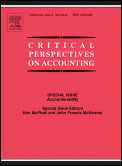
Critical Perspectives on Accounting
Scope & Guideline
Navigating Complexities in Accounting and Beyond.
Introduction
Aims and Scopes
- Critical Examination of Accounting Practices:
The journal provides a platform for critical analyses of accounting practices, exploring how they shape and are shaped by social, political, and economic contexts. - Interdisciplinary Approaches:
Research published in the journal often draws from various disciplines, including sociology, political science, and economics, to enrich the understanding of accounting phenomena. - Focus on Social Justice and Accountability:
A consistent theme within the journal is the exploration of how accounting practices impact social justice, equity, and accountability, particularly in marginalized communities. - Decolonial Perspectives:
The journal emphasizes the importance of decolonial perspectives in accounting research, highlighting the need to challenge and rethink traditional accounting paradigms. - Impact of Technology on Accounting:
Recent publications have increasingly focused on the implications of digital technologies, such as AI, on accounting practices and the profession. - Historical and Cultural Contexts:
The journal frequently addresses the historical and cultural dimensions of accounting, examining how these factors influence current practices and discourses.
Trending and Emerging
- Critical Perspectives on Technology in Accounting:
There is a growing body of work examining the implications of technologies such as AI and big data on accounting practices, focusing on both opportunities and ethical challenges. - Decolonial Accounting Frameworks:
Emerging contributions from Latin America and other regions are pushing for a decolonial approach to accounting, challenging established norms and advocating for inclusive practices. - Social Movements and Accounting:
Research increasingly explores the intersection of social movements and accounting, particularly in how accounting practices can both enable and challenge social justice initiatives. - Environmental Accounting and Sustainability:
There is a marked increase in studies addressing environmental accounting and sustainability, reflecting a broader societal concern for ecological issues and accountability. - Gender and Diversity in Accounting:
Scholarly work focusing on gender, diversity, and inclusion within accounting is on the rise, examining the barriers faced by underrepresented groups and advocating for equitable practices. - Narratives and Discourse in Accounting:
An emerging theme is the analysis of narratives and discourses surrounding accounting, revealing how language shapes perceptions of accountability and ethical practices.
Declining or Waning
- Traditional Financial Reporting Practices:
There is a noticeable decline in research focused solely on conventional financial reporting practices, as scholars shift towards more critical and contextual analyses. - Purely Technical Accounting Issues:
Research that emphasizes purely technical aspects of accounting, such as compliance and procedural efficiency, is becoming less frequent, giving way to discussions about the broader implications of accounting practices. - Sole Focus on Corporate Accountability:
The emphasis on corporate accountability, while still relevant, is being challenged by broader discussions that include social and environmental accountability, reflecting a shift in priorities among researchers. - Minimalist Approaches to Accounting Ethics:
There is a reduction in publications focusing on minimalist or surface-level ethical considerations in accounting, as the discourse moves towards deeper, systemic critiques. - Historical Accounting Practices:
Research centered on historical accounting practices without a critical lens is decreasing, as scholars increasingly seek to connect past practices to contemporary issues of power and inequality.
Similar Journals

Psychotherapy and Politics International
Connecting Mental Health Perspectives with Global Political ContextsPsychotherapy and Politics International is a distinguished journal that explores the intricate interplay between therapeutic practices and political discourse. Based in Germany and published by its own dedicated organization, this journal provides a unique platform for interdisciplinary dialogue, catering to researchers, practitioners, and students interested in the multifaceted dimensions of psychotherapy within political contexts. Although it is not open access, its focus on innovative and critical analyses situates it favorably within the field, holding a Q3 category ranking in the Multidisciplinary field as of 2023. The journal, which has published works from 2013 to 2021, reflects a commitment to advancing the understanding of how psychological theories and practices inform and are influenced by socio-political factors. With an increasing relevance in today's global landscape, Psychotherapy and Politics International serves as a vital resource for those seeking to navigate the convergence of mental health and political dynamics.
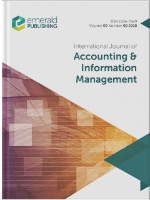
International Journal of Accounting and Information Management
Elevating Standards in Accounting and Information SystemsThe International Journal of Accounting and Information Management, published by Emerald Group Publishing Ltd, is a premier academic journal that has made significant contributions to the fields of accounting, economics, and information management since its inaugural issue in 2007. With an impact factor that places it in the Q1 category for both accounting and economics, it provides a platform for innovative research that addresses contemporary challenges facing these disciplines. The journal is particularly esteemed for its rigorous peer-review process and its commitment to the dissemination of research that integrates the nuances of financial reporting and information systems. Hailing from the United Kingdom, the journal has an expansive global reach, with contributions that delve into the intersections of technology, management, and finance. Researchers, professionals, and students alike benefit from the journal’s high-ranking status, evidenced by its placement in the 96th percentile within general economics and finance on Scopus, making it an essential resource for those looking to advance their knowledge and engage with cutting-edge scholarship.
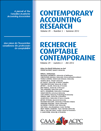
CONTEMPORARY ACCOUNTING RESEARCH
Shaping the Landscape of Modern Accounting PracticesCONTEMPORARY ACCOUNTING RESEARCH, published by WILEY, is a premier, peer-reviewed journal based in the United States that has been at the forefront of the accounting field since its inception in 1984. The journal, recognized for its robust Q1 quartile rankings in Accounting, Economics and Econometrics, and Finance for 2023, serves as an invaluable resource for academics and professionals alike, offering insightful research that influences both theory and practice. With an impressive global reach, as indicated by its high ranks in Scopus—#27 in Accounting and #55 in Finance—the journal is dedicated to publishing high-quality studies that tackle contemporary issues in the financial sector. Although not an open-access publication, it maintains a strong commitment to disseminating top-tier research in the discipline. Researchers, professionals, and students looking to stay abreast of the latest developments in accounting and finance will find CONTEMPORARY ACCOUNTING RESEARCH an essential addition to their academic resources.
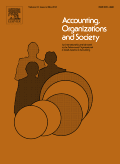
ACCOUNTING ORGANIZATIONS AND SOCIETY
Exploring the Intersection of Accounting and SocietyACCOUNTING ORGANIZATIONS AND SOCIETY, published by PERGAMON-ELSEVIER SCIENCE LTD, stands as a premier journal in the fields of accounting, organizational behavior, and applied psychology, among others. Established in 1976 and converging through to 2024, this esteemed journal boasts a notable impact, placing it in the Q1 category across several disciplines, including Sociology and Political Science, Accounting, and Information Systems Management. With a rank of #17 in Accounting out of 176 journals in the Scopus database, it reflects a high standard of scholarly contribution (90th percentile). Although it does not currently offer open access options, its rigorous peer-review process ensures that published works are of the utmost quality. Researchers and professionals alike rely on ACCOUNTING ORGANIZATIONS AND SOCIETY for pioneering research and insights that inform best practices and guide future developments in the interconnected fields of accounting and organizational studies. As a vital resource for students, academics, and industry leaders, this journal continues to shape the landscape of its disciplines.

Asian Journal of Accounting and Governance
Exploring Innovative Pathways in AccountingAsian Journal of Accounting and Governance, published by Penerbit Universiti Kebangsaan Malaysia, is a vital resource in the field of accounting and governance studies. With its commitment to enhancing the scholarly discourse in Asia and beyond, the journal serves as a platform for innovative research, critical analyses, and discussions that address contemporary issues in accounting practices and governance frameworks. Although specific metrics such as HIndex or Scopus rankings may not be provided, the significance of this journal is underscored by its accessible and scholarly content aimed at researchers, professionals, and students alike. The journal is dedicated to the principles of open access, encouraging broad dissemination and engagement with cutting-edge research in the discipline. Embracing a multidisciplinary approach, the Asian Journal of Accounting and Governance aspires to contribute meaningfully to the understanding and advancement of effective accounting systems and governance practices within diverse contexts.
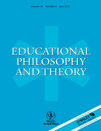
Educational Philosophy and Theory
Advancing Thoughtful Discourse in Educational TheoryEducational Philosophy and Theory, published by Taylor & Francis Ltd, serves as a premier platform for scholarly discourse at the intersection of education, philosophy, and science. With an impressive impact factor reflected by its Q1 categorization in both Education and History and Philosophy of Science, this journal has established itself as a leading voice since its inception in 1969. It is notably ranked 13th in History and Philosophy of Science and 366th in Education according to Scopus, positioning it within the top tiers of academic research. This journal encourages critical discussions, innovative methodologies, and interdisciplinary approaches to educational issues, making it an essential resource for researchers, educators, and students alike who seek to deepen their understanding of the philosophical frameworks that underpin educational practices. Although currently not an Open Access journal, it remains committed to providing high-quality, peer-reviewed content that influences both theoretical and practical aspects of education. Join the dialogue in shaping the future of educational philosophy by exploring the latest research and theories published herein.
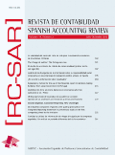
Revista de Contabilidad-Spanish Accounting Review
Shaping the Future of Finance Through Rigorous Research.Revista de Contabilidad-Spanish Accounting Review, published by the Universidad de Murcia, is a prestigious open-access journal dedicated to advancing the field of accounting and finance. Since its inception in 1997, the journal has aimed to foster high-quality research and disseminate innovative findings that contribute significantly to the international accounting community. With an ISSN of 1138-4891 and an E-ISSN of 1988-4672, this journal proudly embodies a commitment to accessibility, allowing researchers, practitioners, and students to engage with a wealth of knowledge without financial barriers. As of 2023, it holds a respectable position in the Scopus rankings, being placed in the Q3 category within Accounting, with a ranking of #98/176 and a percentile standing at 44th. The Revista covers a wide array of topics including financial reporting, auditing, and managerial accounting, and is a pivotal platform for groundbreaking studies that shape the discipline. Located in the vibrant academic setting of Murcia, Spain, this journal is essential reading for those looking to stay abreast of contemporary developments in accounting research.
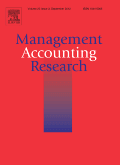
Management Accounting Research
Transforming Decision-Making with Cutting-Edge Management Accounting StudiesManagement Accounting Research is a premier peer-reviewed journal published by Elsevier, dedicated to advancing the understanding of management accounting practices and their impact on business decision-making. With a strong reputation in the field, it has achieved an impressive ranking within the top quartile (Q1) in prominent categories such as Accounting, Finance, and Information Systems and Management, making it a valuable resource for researchers and professionals alike. The journal's ISSN is 1044-5005 and its E-ISSN is 1096-1224, ensuring a wide reach among academic and industry experts. It aims to publish high-quality research that contributes to theoretical development and practical application in management accounting, thus influencing both scholarly discourse and organizational practices. With an emphasis on interdisciplinary approaches and innovative methodologies, Management Accounting Research caters to a diverse readership while maintaining a rigorous review process that upholds the highest academic standards. The journal spans a comprehensive publication period from 1990 to 2024, providing a rich archive of contemporary research that continues to shape the discipline.
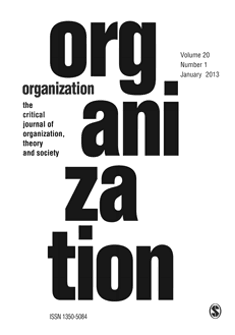
ORGANIZATION
Fostering Innovation in Organizational PracticesORGANIZATION is a leading academic journal published by SAGE Publications Ltd, specializing in the dynamic fields of Business, Management, and Accounting. With an impressive impact factor and a reputation cemented by its Q1 ranking in multiple categories—including Strategy and Management, Management of Technology and Innovation, and General Business—this journal is a cornerstone for researchers and practitioners alike. Since its inception in 1994, ORGANIZATION has been at the forefront of advancing knowledge and fostering discussions around innovative practices and strategic insights that shape organizational behavior. Based in the United Kingdom, this journal is recognized for its rigorous peer-review process and is accessible to a global audience, thus promoting wide dissemination of critical scholarly work. With a commitment to excellence, ORGANIZATION continues to serve as an essential resource for scholars and professionals engaged in navigating the complexities of modern organizational dynamics.

AGRICULTURAL HISTORY
Connecting Agriculture and Society Through TimeAGRICULTURAL HISTORY, published by DUKE UNIVERSITY PRESS, is a prominent academic journal that has been a vital resource in the fields of agricultural sciences and historical studies since its inception in 1975. With an ISSN of 0002-1482 and E-ISSN of 1533-8290, this journal holds an impressive reputation reflected in its SCImago rankings: it ranks in the Q2 quartile in Agricultural and Biological Sciences (miscellaneous) and Q1 in History, highlighting its relevance and scholarly impact. The journal serves as a platform for groundbreaking research that explores the intricate relationships between agriculture and society throughout history. Though not an open access journal, the content is widely regarded for its rigor and depth, appealing to researchers, professionals, and students interested in understanding the role of agriculture in shaping historical narratives and contemporary issues. The journal remains committed to advancing knowledge within its scope while fostering critical discourse across disciplines.